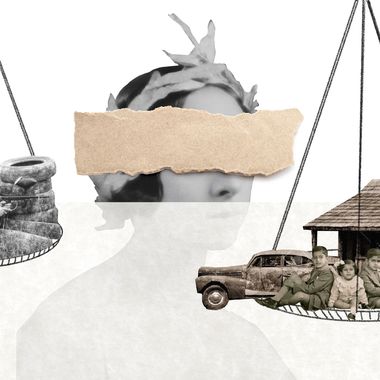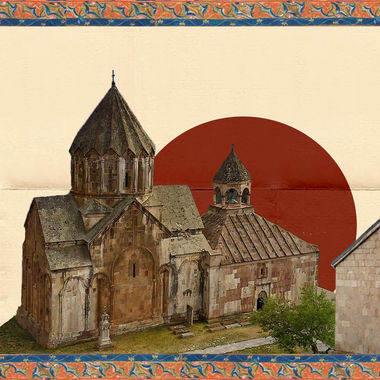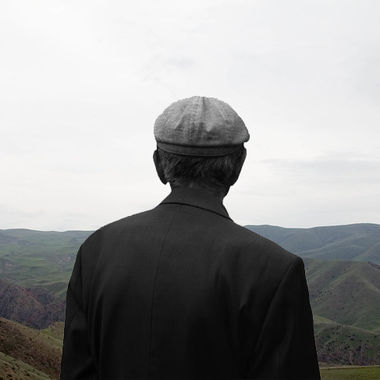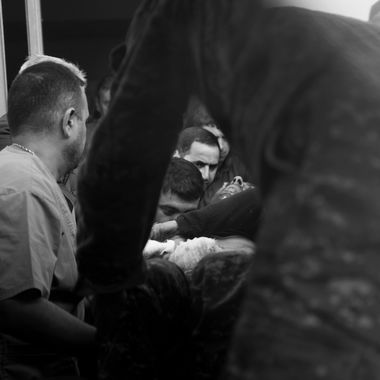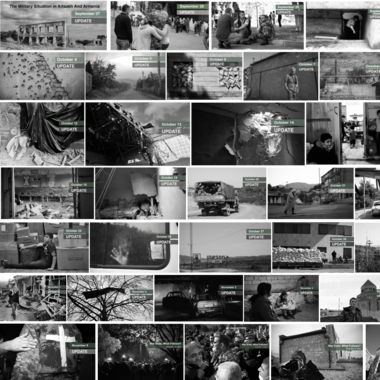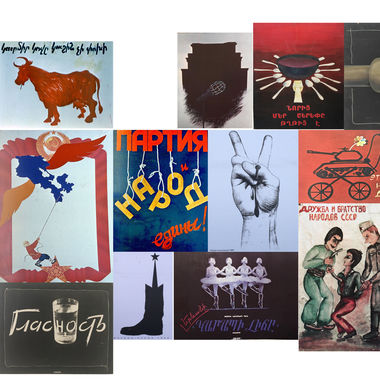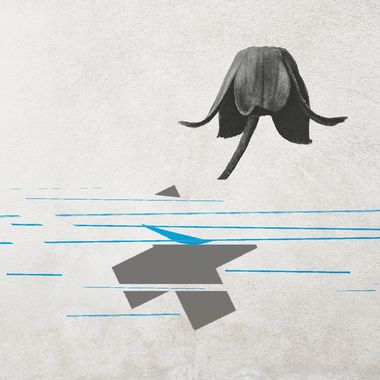Tue Sep 28 2021 · 16 min read
Armenia and Azerbaijan Take Fight to ICJ

By Gabriel Armas-Cardona Esq.
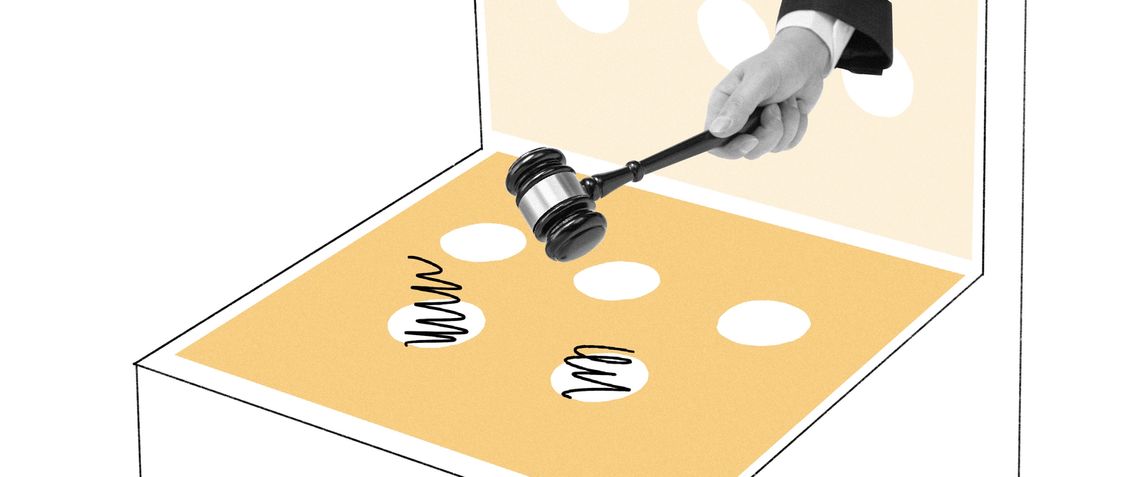
Illustration by Armine Shahbazyan.
On September 16, 2021, the International Court of Justice (ICJ) issued a press release announcing that Armenia had instituted proceedings against Azerbaijan on the basis of violations of the Convention on Elimination of Racial Discrimination (CERD). Armenia bringing proceedings to the ICJ is a new development. Previously, the only international judicial body to engage with the Nagorno-Karabakh conflict has been the European Court of Human Rights (ECtHR), as both countries are members of the Council of Europe. The ECtHR has dealt with multiple cases based on the conflict situation, notably releasing pairs of cases simultaneously to present a perception of equality to both states (see Chiragov and Others v. Armenia and Sargsyan v. Azerbaijan).
The Unique Provisions of the CERD
The CERD is not only a very old human rights treaty but in fact the first one ever created. It predates the International Covenant on Civil and Political Rights (ICCPR) and the International Covenant on Economic, Social and Cultural Rights (ICESCR), which were both based off the 1948 Universal Declaration of Human Rights (UDHR), by a decade. Because of that, it was drafted in a slightly different way than modern treaties are.
First of all, it is much shorter. There are only six articles in the treaty that establish substantive rights (Articles 2-7). In contrast, the 1989 Convention on the Rights of the Child (CRC) has 40 (Articles 2-41). While the text may be brief, many of the core rights one would expect are there, including equal treatment before the courts (Article 5a) and a right to a remedy if someone is the victim of discrimination (Article 6).
Secondly, and importantly, the CERD makes it very easy for states to bring a case to the ICJ. Article 22 provides:
Any dispute between two or more States Parties with respect to the interpretation or application of this Convention, which is not settled by negotiation or by the procedures expressly provided for in this Convention, shall, at the request of any of the parties to the dispute, be referred to the International Court of Justice for decision, unless the disputants agree to another mode of settlement.
In essence, this article is saying that, if there is a dispute between two states regarding the CERD, and they are not able to settle it through negotiations, then either state can bring a suit to the ICJ. Thus, there are only two conditions to bring a suit: a dispute regarding the CERD and negotiations that failed to settle the dispute. No other human rights treaty provides such a direct route to the ICJ. Normally, states must consent before they can be sued in the ICJ. Currently, 74 countries have made declarations that they provide this consent. However, neither Armenia nor Azerbaijan have issued such declarations.
Armenia acceded to the treaty (became legally bound) in 1993, and Azerbaijan in 1996. Thus, Armenia could utilize Article 22 to bring a suit against Azerbaijan. If Armenia wanted to bring a claim against Azerbaijan regarding any other international law violation, Azerbaijan would first have to consent to the suit. In its Application to the Court, Armenia alleges violations of Articles 2-7 of CERD.
ICJ Jurisdiction
Thanks to CERD’s unique provisions, it was Armenia’s only realistic option to get to the ICJ. Armenia didn’t need Azerbaijan’s consent and instead needed only to show it fulfills the two conditions: a dispute and failed negotiations.
Armenia fulfills the first requirement quite easily. In a letter from November 11, 2020, Armenia claims “Azerbaijan has violated and is currently violating its obligations… under Articles [2-7 of the CERD].” Azerbaijan cemented the fact that there is a dispute regarding the CERD in its response on December 8, saying that Azerbaijan “rejects Armenia’s allegations as set forth in its 11 November Letter.”
The second condition is trickier, but Armenia took to heart the lesson that Georgia learned the hard way. In 2008, after the Russo-Georgian War, Georgia brought a claim against Russia to the ICJ alleging violations of the CERD. Russia submitted a counterclaim. Both states sought provisional measures, which are applied immediately, before the ICJ reviews the substance of the claim. The ICJ ordered provisional measures in a controversial opinion; these are discussed below. Only after this stage could the ICJ then assess whether the case was admissible. Three years later, in 2011, the ICJ ultimately held that the case was not admissible because the parties had never engaged in any serious attempts to negotiate disputes regarding the CERD. Having general negotiations regarding the conflict were insufficient; negotiations had to be specifically about the CERD.
In light of Georgia’s loss, Armenia made an overwhelming attempt to negotiate to ensure it doesn’t suffer the same fate. According to Armenia’s Application, Armenia sent over 40 letters and participated in seven rounds of meetings aimed at resolving the dispute. If true, this almost-excessive number of attempts is to ensure that the second condition is met.
Intended Outcome and the Focus on Provisional Measures
Armenia requests relief on the merits of the case, but the real heart of the application is in the provisional measures requested. The Court itself noted that Armenia considers the need for provisional measures “as a matter of extreme urgency.”
Provisional measures are measures that the ICJ can order at the beginning of a case to ensure no irreparable prejudice occurs in the time it takes for the Court to issue its decision. The purpose of these measures is to “preserve the respective rights of either party” during the case. All court systems have something similar; the same idea is called a preliminary injunction in the U.S. and UK, and a preliminary legal protection order in continental Europe. Provisional measures would be applied immediately, while relief on the merits only occurs years later, after the Court issues its judgment.
The Court will only issue provisional measures when there is a matter of urgency and “when irreparable prejudice could be caused… or when the alleged disregard of such rights may entail irreparable consequences.” To be considered urgent, there must be a “real or imminent risk” or a risk of irreparable harm could “occur at any moment.”
Armenia has put its concrete requests within the provisional measures, whether they are likely to succeed as a provisional measure or not. One can see this by comparing the ambiguous requests on the merits in Paragraph 97 of the Application (e.g. “punishing all acts of racial discrimination, both public and private, against Armenians”) to the provisional measures in Paragraph 131 (e.g. “Azerbaijan shall immediately release all Armenian prisoners of war, hostages and other detainees in its custody who were made captive during the September-November 2020 armed hostilities or their aftermath.”).
In short, Armenia is requesting:
-
The release of Armenian POWs and detainees and their treatment in compliance with the CERD,
-
Closing the Military Trophies Park,
-
Protection of Armenian cultural monuments and landmarks, and
-
Regular reporting from Azerbaijan on its compliance with the provisional measures.
Reviewing each of these one by one, Armenia is not likely to get what it is requesting regarding the first two points, but likely will on the second two points.
The Armenian POWs remain a serious issue in Armenia’s political discourse, and it’s not surprising that that request was included, especially after Azerbaijan put them on trial. Specifically, Armenia is requesting two things: the release of all Armenian POWs and their treatment in compliance with the CERD pending their release. The first request won’t be granted by the Court, but the second likely will. Requiring Azerbaijan to release its Armenian POWs would foreclose any further analysis; if Azerbaijan won on the merits, there is no way to return those POWs to Azerbaijani captivity. Thus, releasing the POWs would actually do the opposite of “preserv[ing] the rights of the party”, which is the purpose of provisional measures. A much more likely result, as suggested by Prof. Becker, is a provisional measure requiring Azerbaijan to treat POWs in accordance with Articles 5 & 6 of the Convention, including their rights to equal treatment and to a remedy.
Similarly, it’s unlikely the ICJ will order a provisional measure to close the Military Trophies Park. While Azerbaijan has an uphill battle to justify how the park is not a violation of the CERD, especially when the creators publicly stated that they intentionally depicted Armenians as ugly, cowardly and inhuman, that’s not the test for provisional measures. Provisional measures require that there is an urgent threat of irreparable prejudice. Just being a continuous violation is not enough. It’s unclear what sort of urgent, irreparable harm could occur from the continued operation of the park, so it’s unlikely that the Court will order it closed immediately.
In contrast, the protection of Armenian cultural monuments has a much better chance of succeeding. There is satellite imagery of multiple Armenian cultural sites, including churches, cemeteries and landmarks having been bulldozed since Azerbaijan took control of the territory. Armenian cultural sites in Azerbaijan experienced similar treatment even before last year’s war, with the UNESCO-protected site of Julfa Cemetery being the most well-known example, where over 2,000 Armenian tombstones were turned into rubble and dumped into the Araks River. With this historical evidence, current evidence, and the fact that destroyed cultural sites are irreparable losses, it’s likely the Court will grant a provisional measure on this issue.
The regular reporting request will likely also be successful as this has become more common.
Strategically, Armenia’s approach of focusing on provisional measures makes sense. Armenia’s request for provisional measures is very similar to the one that Georgia made in 2008. Both countries requested provisional measures after a major military defeat during an ongoing conflict, and both requests highlighted violations by the opposing state dating back decades. The Court ultimately granted Georgia’s request for provisional measures, but it was controversial with eight justices in favor and seven against. The seven against questioned some of Georgia’s description of the dispute and believed that Georgia had not fulfilled the Article 22 requirements. Armenia’s request stands on firmer ground. It cites specific actions done by Azerbaijan since the end of the period of active fighting, unlike Georgia’s request (e.g. one of Georgia’s requested provisional measures was that Georgians “[not be] subject to violent or coercive acts of racial discrimination”). Furthermore, while the previous grant was controversial, it was successful. So the provisional measures provided to Georgia act as a form of precedent for Armenia.
Armenia’s focus on provisional measures also comes from a position of necessity due to its unstable reality. A case on the merits takes years, and it’s unknown what the situation on the ground will be like then. Even if Armenia wins on the merits, if Azerbaijan is able to exploit its more powerful position, any judgment of the Court could be a hollow victory.
Azerbaijan’s Mirroring Response
On September 23, a week later, Azerbaijan submitted its own claim against Armenia. Even during the conflict, it was common for Azerbaijan to mirror Armenian accusations. Interestingly, despite Azerbaijan saying it planned to file a countersuit, it actually submitted an entirely distinct application (i.e. started a new case). Azerbaijan also requested provisional measures in a separate document.
Jurisdiction of Azerbaijan’s Application
Azerbaijan goes a similar route to claim jurisdiction. Their application references a letter from December 8, 2020, that Azerbaijan sent to Armenia, alleging a dispute of CERD obligations. Azerbaijan likely recognized that Armenia’s letter of November 11 was a means to gain jurisdiction, so it acted similarly to have its own route to jurisdiction. Similar to Armenia, Azerbaijan claims that it raised the dispute in 40 notes and eight rounds of meetings to show a failure of negotiations. For the reasons stated above regarding Armenia’s application, it’s very likely that Azerbaijan will be granted jurisdiction.
To be clear, none of this was necessary. Azerbaijan could have in a sentence simply noted Armenia’s claim, agreed that a dispute exists, and that negotiations have failed. Alternatively, Azerbaijan could have simply consented to the Court’s jurisdiction through the Forum prorogatum rule. Instead, Azerbaijan made no mention within its application to Armenia’s application. That means the cases could be treated as entirely distinct cases by the Court.
Why Azerbaijan decided to go down this route is unclear. However, what is known is that Azerbaijan had prepared this case before Armenia’s application became public. Even a team of top lawyers could not have prepared a legal brief of a hundred pages in a week.
Azerbaijan’s Request for Provisional Measures
Azerbaijan also made requests on the merits of the case but, for the same reasons described above, I will focus on the provisional measures they are requesting instead. They are:
a) Armenia shall “enable Azerbaijan to [demine] … landmines laid in Azerbaijan’s territory”, including by providing maps of landmines.
b) Armenia must plant no further mines in Azerbaijan’s territory.
c) Armenia must prevent organizations, including VoMa, from engaging in the incitement of racial hatred against Azerbaijanis.
d) Armenia must collect and preserve evidence related to ethnically motivated crimes against Azerbaijanis.
e) “Armenia shall refrain from any measure that might aggravate, extend, or make more difficult the resolution of this dispute.”
f) Armenia shall regularly report to the Court.
The latter, (f), will likely be successful as discussed above for Armenia’s provisional measures. The first five can be divided into two groups: conflating war with racism and prohibiting hate speech and crimes.
Conflating War With Racism – (a), (b) and (e)
Without commenting on the strength of Azerbaijan’s arguments regarding the merits of the case, Azerbaijan faces a major weakness regarding the provisional measures it seeks: Armenia isn’t in control of either Azerbaijanis or Azerbaijani territory. As a result of last year’s war, Armenia lost control of the seven territories surrounding the former Nagorno-Karabakh Autonomous Oblast (NKAO) and now Russian peacekeepers provide security for the Armenians of Artsakh. Since Armenia has limited ability to impact the situation directly, there’s little space to request a provisional measure on Armenia.
Some background on human rights law helps to explain why it’s difficult to impose provisional measures on Armenia. Traditional human rights—of which the CERD belongs—envisioned human rights as a vertical relationship between state and individual; you have the state as duty bearer and its nationals as rights holders. This is the dynamic one can envision within most countries: people live within a space where the state government can greatly impact their lives. The problem with this traditional model is that it doesn’t apply to circumstances where this clear structure doesn’t exist, such as in conflict zones, occupied territories, or spaces of limited state control. While human rights advocates have fought hard to extend human rights obligations beyond a state’s borders, essentially no one claims that there should be human rights obligations imposed on states that have no control or even impact on a situation.
Azerbaijan tries to side-step this issue in (a) by asking Armenia to provide maps of landmines laid by “the Armenian military and/or other groups [controlled by] Armenia” (i.e. soldiers of the Republic of Artsakh). Azerbaijan is trying to impose an extraterritorial obligation based on past action. Such a provisional measure would require Armenia to fulfill a task rather than refrain from something. While it’s possible for provisional measures to require positive actions, it’s not common and needs more justification to show that the positive action is required to realize the purpose of provisional measures: to protect the rights of the parties from irreparable harm that could occur during the court case. If Armenia were required to provide the maps, then it would moot Armenia’s rights on the issue; there’s no way to take back the maps. This request will almost certainly fail in the same way that Armenia’s request for a provisional measure to release the POWs will.
This tenuous connection to human rights obligation is made further tenuous by trying to paint any harm to Azerbaijanis as a form of racial discrimination. As said above, the CERD is part of the traditional model of human rights. The CERD in particular is focused on protecting racial and ethnic minorities. The prototypical example is a racial minority whose rights are undermined due to segregation, apartheid or colonialism. The bulk of CERD’s obligations would apply to any Azerbaijanis within Armenia, but not to Azerbaijanis in general.
This shows the weakness of (b) by trying to claim that planting landmines in Azerbaijan is a form of racial discrimination. Please understand: if Armenia is planting landmines on Azerbaijani territory after the ceasefire of November 10, 2020, that is a clear violation of the agreement. However, it’s not a violation of the CERD. Not all actions taken in a conflict are racially motivated. Otherwise, one could say that any violence in any interethnic conflict, whether the Kosovo War or the Israeli-Palestinian conflict, was a form of racial discrimination.
Azerbaijan goes to the extreme in (e), saying Armenia must not aggravate the dispute. The term “dispute” is ambiguous but, to be blunt, the request doesn’t make sense whether “dispute” is interpreted as the general conflict between the two countries or the CERD dispute. In the former interpretation, Azerbaijan would be asking the Court to go well beyond the limits of the CERD, which is not a treaty about inter-state conflicts. In the latter interpretation, Azerbaijan isn’t actually requesting anything. The provisional measure would either be asking Armenia to comply with its legal obligations under the CERD, which is already a requirement, or to not engage in otherwise legal actions. Whether Armenia is or isn’t violating its obligations is a question for the merits stage, and the Court would not nor could not issue a provisional measure prohibiting a legal action. This request is not only too ambiguous as a provisional measure, but it adds nothing that could prevent an irreparable harm. At best, this provisional measure would provide rhetorical value for Azerbaijan.
Prohibiting Hate Speech and Crimes – (c) and (d)
Regarding (c) and (d), Azerbaijan stands on firmer footing. These requests would require Armenia to act regarding issues it actually has control over.
The Court will likely grant a provisional measure regarding (c), but it will likely be reduced and apply to both Armenia and Azerbaijan. The relevant legal obligations here are Articles 2 and 4. Article 2 requires a state to not engage in any act of racial discrimination, support racial discrimination by persons or organizations, and prohibit and bring to an end racial discrimination. Article 4 requires a state to condemn all propaganda promoting racial superiority and prohibit organizations promoting racial discrimination (the more common term “hate speech” is included here). Thus, the Court could impose a provisional measure requiring both Armenia and Azerbaijan to comply with those obligations. Here is the relevant provisional measure the Court ordered in the case between Georgia and Russia:
Both Parties, within South Ossetia and Abkhazia and adjacent areas in Georgia, shall
(1) refrain from any act of racial discrimination against persons, groups of persons or institutions;
(2) abstain from sponsoring, defending or supporting racial discrimination by any persons or organizations;
The second requirement would apply to Armenia and VoMa, meaning that any statement of racial discrimination by VoMa cannot be sponsored, defended or supported by Armenia. As VoMa’s primary mission is to provide training on marksmanship and first aid, I don’t foresee any impact on the organization.
The Court is also likely to grant (d), again applying it to both parties. Both Armenia and Azerbaijan presented evidence to the Court of abuses driven by ethnic animus. The Court is not going to sift through facts at this stage and instead will point out that both states have the obligation to provide equal treatment before tribunals and that includes protecting evidence relevant to a prosecution. What the Court won’t do at this stage, and maybe not at all, is to review abuses occurring within the context of the armed conflict.
Impact on the Conflict
The provisional measures—even those requested by Azerbaijan—would impact the conflict in the short-term by helping Armenia resist some of the pressure imposed by Azerbaijan. Being in a weaker position, Armenia wants to bring in as much outside attention as possible. ICJ’s provisional measures will not be earth-shattering, but still a welcome development from Armenia’s perspective. The situation would be quite similar to Georgia after it received its requested provisional measures in 2008. One small positive note is that, if the measures lead to the protection of cultural sites or reduce state-sponsored racial animus, that would remove two of the many key emotional issues of the conflict.
International law only plays a partial role in any conflict; rarely does a single judicial decision end a conflict with ethnic and territorial considerations, especially one that is decades old. On top of that, the ICJ’s opinion will only cover a facet of the conflict and not get to its heart: balancing the right of the Armenians of Nagorno-Karabakh to self-determination against Azerbaijan’s territorial integrity. In this sense, one can look at the Palestinian Wall advisory opinion to see the ICJ’s impact. In that 2004 advisory opinion, the ICJ advised that the separation wall Israel was building at the time violated international law. To anyone following the Israeli-Palestinian conflict, they’ll know that that wall still stands despite the advisory opinion.
One benefit the Court could provide in theory but won’t is to establish a common narrative of the conflict. Both countries raise facts starting from the early 20th century. This means that the Court will be presented with both side’s narratives of the entire conflict, not just concrete violations of the CERD. This conflict is in desperate need of a truth commission that can establish a common narrative, rather than having each side focus on the abuses they’ve experienced and ignoring the ones their side committed. But this is not the role of the Court and certainly not the role of provisional measures.
Also see
Azerbaijan’s Mirror Propaganda Operation
By Arshaluys Barseghyan
During the Artsakh War, Azerbaijan used mirroring propaganda to try and keep the two sides on equal moral terms, creating an information fog until international journalists began arriving to the conflict zone.
Duplicating Images: Azerbaijan’s Mirror Propaganda Operation Part II
By Arshaluys Barseghyan
As part of its mirroring propaganda operation during the war that was intended to cloud the information landscape, Azerbaijan also systematically mirrored the Armenian side’s visuals as well.
Armenia v. Azerbaijan: On the Frontlines of the Law
By Lusine Sargsyan
The military phase of the 2020 Artsakh War seems to have ended but the legal fight for restoring and upholding human rights is just beginning. Armenia’s Inter-State Application against Azerbaijan to the ECHR marks the beginning of that strategic process.
Christianity in Karabakh: Azerbaijani Efforts At Rewriting History Are Not New
By Hratch Tchilingirian
In the context of the Armenian-Azerbaijani conflict, the “Albanian connection” has become a politicized issue of irredentism, hijacking the rich Christian heritage of Karabakh. The roots of this historiography go back to the Soviet policy of “nativization".
Artsakh’s Cultural Heritage Under Threat
By Hovhannes Nazaretyan
Armenian cultural, religious and historical monuments and sites currently under Azerbaijani control in the aftermath of the 2020 Artsakh War are under immediate threat of vandalism and destruction.
Remedial Rights in International Law and Their Relevance to Artsakh
By Sossi Tatikyan
In light of the existential threat, high probability of ethnic cleansing and the already imminent humanitarian crisis in Artsakh, the international community has an obligation to grant remedial recognition to Artsakh.
Current Projects and Plans of Azerbaijan in the Conquered Regions of the Artsakh Republic
By Areg Petrosyan
After its victory in the 2020 Artsakh War, Azerbaijan started massive restoration projects in the seven conquered regions of the Republic of Artsakh. These projects will undoubtedly impact Armenia.
Baku’s Military Trophy Park and the Defeat of Humanity
By Maria Titizian
A Military Trophy Park-Museum dedicated to Azerbaijan’s military victory over Artsakh was inaugurated in Baku. It is a gruesome display that includes hundreds of helmets of Armenian soldiers killed in battle and grossly exaggerated life-size figures of dead and dying captives.
New on Spotlight Karabakh
A Chronology of the 44 Days of War
Today, September 27, marks the one year anniversary of the start of the 2020 Artsakh War. Here is a chronology of the 44 days of war and beyond that we published last year.
Breaking the Immunity of Dictators
By Irina Ghaplanyan
Dictators are emboldened by the silence of those who claim to be proponents of human rights and justice. Turkey’s Erdogan and Azerbaijan’s Aliyev must be held accountable for war crimes and crimes against humanity, writes Irina Ghaplanyan.
The Guardian Women of the Front Lines
By Kushane Chobanyan
While the majority of women didn’t pick up guns to fight in the war, many used their skills to fight in their own way. On this first anniversary of the 2020 Artsakh War, Kushane Chobanyan presents the stories of six extraordinary women who were on the front lines.
Podcast
On the first day of the 2020 Artsakh War, the Government of Armenia submitted its first interim measure against Azerbaijan at the European Court of Human Rights. Since then, the Government has submitted other applications with regard to violations committed by both Azerbaijan and Turkey during and after the war. Yeghishe Kirakosyan, the Republic of Armenia’s Representative before the ECHR, speaks to EVN Report about the ongoing crisis with Armenian POWs and civilian captives, state-sponsored Armenophobia, destruction of monuments, historical revisionism and a global double standard.
In the early hours of July 28, 2021, Azerbaijani forces launched yet another attack against Armenian positions, this time in the Gegharkunik region, leaving three Armenian soldiers dead and a number of wounded. Tatevik Hayrapetyan, an expert on Azerbaijan, speaks to EVN Report about the intentions of Baku following the end of the 2020 Artsakh War, the Armenian response and the psychological toll of constant aggression.
Ambassador Nico Schermers of the Netherlands presented his credentials to Armenia’s president four days before the outbreak of the 2020 Artsakh War. He speaks to EVN Report about the importance of being on the ground at a time of war, his recent trip to Syunik with a group of ambassadors from EU countries and his embassy’s mission in Armenia.
Comments
Mikael Vardanyan
9/30/2021, 6:03:01 PMAmazing job, thanks for sharing your thoughts!



